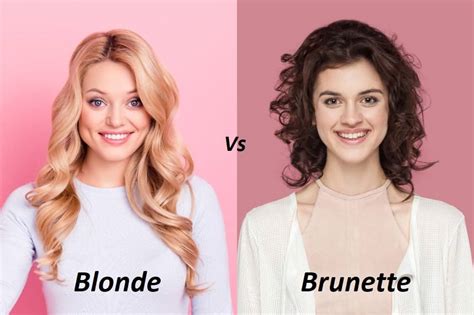When it comes to hair color, blonde and brunette continue to reign supreme as the most popular choices. But which shade is truly the best? In this in-depth comparison, we delve into the pros and cons of each color to help you make an informed decision.

Key Statistics
- Population Distribution: 1-2% of the world’s population is naturally blonde, while 50-80% is brunette.
- Celebrity Impact: Blonde hair is commonly associated with Hollywood glamor and sophistication, while brunette hair is often seen as more approachable and down-to-earth.
- Cultural Significance: Blondes have been stereotyped as being more delicate and frivolous, while brunettes are often perceived as being more intelligent and serious.
Blonde Hair: Pros and Cons
Pros:
- Versatile: Blonde hair complements a wide range of skin tones and eye colors.
- Youthful: Lighter shades of blonde can help create an illusion of youthfulness.
- Stylish: Blonde hair is often seen as trendy and sophisticated.
- Attention-grabbing: Lighter shades of blonde can turn heads and make a statement.
Cons:
- High Maintenance: Blonde hair requires frequent touch-ups to maintain color vibrancy.
- Damage-prone: Bleaching hair to achieve blonde shades can damage hair and make it more prone to breakage.
- Can be harsh: Platinum blonde shades can create an unnatural and harsh appearance.
Brunette Hair: Pros and Cons
Pros:
- Low Maintenance: Brunette hair generally requires less upkeep than blonde hair.
- Natural-looking: Brunette shades blend seamlessly with a variety of skin tones, creating a more natural and effortless look.
- Sophisticated: Darker shades of brunette can convey professionalism and maturity.
- Versatile: Brunette hair can be styled in a wide range of ways, from sleek to messy.
Cons:
- Can be flat: Some brunette shades can lack depth and appear flat.
- Can be aging: Darker shades of brunette can make hair look thinner and more wiry.
- Can be difficult to lighten: Transitioning from brunette to blonde hair can be a challenging process that requires multiple appointments.
Color Considerations
Skin Tone:
- Fair Skin: Blonde hair can complement fair skin by creating a soft and flattering contrast.
- Olive Skin: Warm blonde shades can bring out the golden undertones in olive skin.
- Dark Skin: Brunette shades can create a striking contrast against dark skin, emphasizing facial features.
Eye Color:
- Blue Eyes: Blonde hair can enhance the brightness of blue eyes.
- Brown Eyes: Brunette hair can create a warm and earthy look with brown eyes.
- Hazel Eyes: Both blonde and brunette hair can complement hazel eyes, depending on the shade.
Personal Style
Ultimately, the best hair color for you depends on your personal style and preferences. Consider the following questions:
- Do you prefer a bold and attention-grabbing look, or a more natural and effortless one?
- How much time and effort are you willing to dedicate to hair maintenance?
- What hair color best complements your skin tone and eye color?
Tables
Table 1: Blonde Hair Types
| Shade | Description |
|---|---|
| Platinum Blonde | Icy white-blonde |
| Ashy Blonde | Cool-toned, gray-blonde |
| Honey Blonde | Warm-toned, golden-blonde |
| Strawberry Blonde | Reddish-blonde with pink undertones |
| Goldilocks Blonde | Natural, buttery blonde |
Table 2: Brunette Hair Types
| Shade | Description |
|---|---|
| Jet Black | Deepest and darkest shade of brunette |
| Dark Brunette | Rich and chocolatey shade of brunette |
| Medium Brunette | Natural and versatile shade of brunette |
| Light Brunette | Warm and golden shade of brunette |
| Auburn | Reddish-brown shade of brunette |
Table 3: Hair Color and Maintenance
| Hair Color | Maintenance Frequency |
|---|---|
| Platinum Blonde | Every 2-4 weeks |
| Ashy Blonde | Every 4-6 weeks |
| Honey Blonde | Every 6-8 weeks |
| Strawberry Blonde | Every 8-12 weeks |
| Goldilocks Blonde | Rarely requires touch-ups |
| Jet Black | Rarely requires touch-ups |
| Dark Brunette | Every 8-12 weeks |
| Medium Brunette | Every 12-16 weeks |
| Light Brunette | Every 16-20 weeks |
| Auburn | Every 12-16 weeks |
Table 4: Hair Color and Skin Tone
| Skin Tone | Flattering Blonde Shades | Flattering Brunette Shades |
|---|---|---|
| Fair | Platinum, Ashy, Honey | Jet Black, Dark Brunette |
| Olive | Warm, Honey, Strawberry | Medium Brunette, Auburn |
| Dark | Goldilocks, Honey | Jet Black, Dark Brunette, Auburn |
FAQs
-
Which hair color is more popular, blonde or brunette? Brunette is generally more common worldwide.
-
Which hair color is more versatile? Blonde hair is more versatile, as it complements a wider range of skin tones and eye colors.
-
Which hair color is easier to maintain? Brunette hair is generally easier to maintain than blonde hair, as it requires less frequent touch-ups.
-
Which hair color is more youthful? Lighter shades of blonde can create an illusion of youthfulness.
-
Which hair color is more sophisticated? Darker shades of brunette can convey professionalism and maturity.
-
Can I transition from blonde to brunette easily? Transitioning from blonde to brunette can be challenging and may require multiple appointments.
-
Can I transition from brunette to blonde easily? Transitioning from brunette to blonde is possible, but it can be a time-consuming and damaging process.
-
Which hair color is more trendy? Hair color trends change constantly, but both blonde and brunette shades remain popular.
